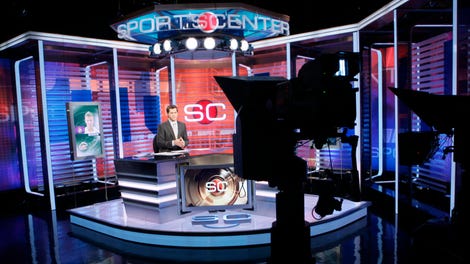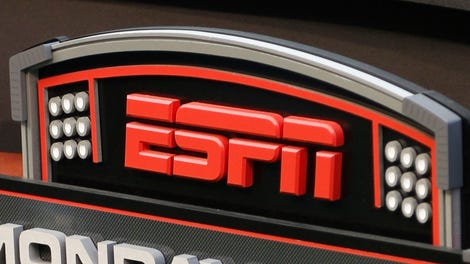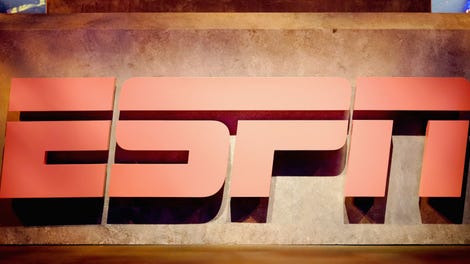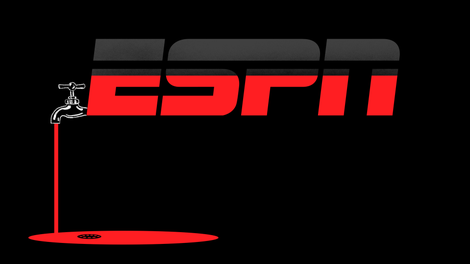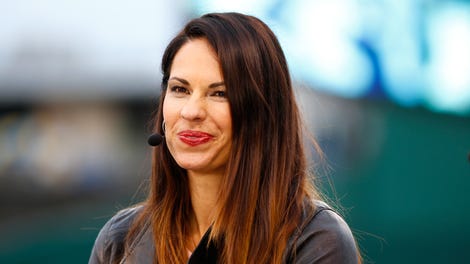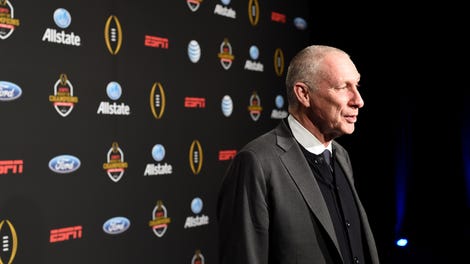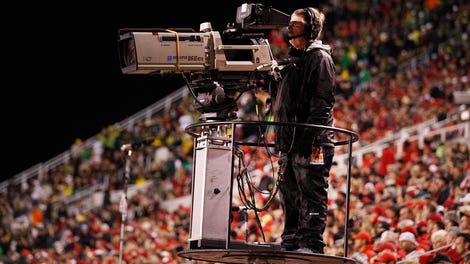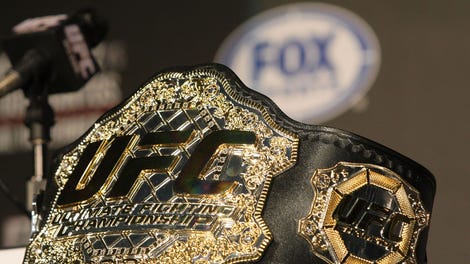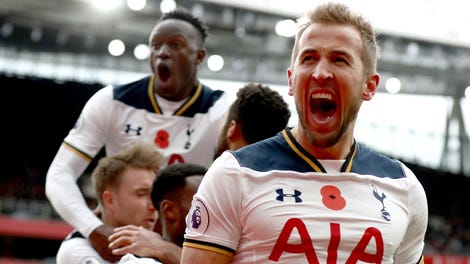Scott Van Pelt hosts the midnight SportsCenter, where he squares up to the camera and talks directly to the viewer, and features segments reflecting his personal interests, like gambling. The 6 p.m. SportsCenter was rebranded “The Six” when Jemele Hill and Michael Smith took over in February; it’s an opinion-driven back-and-forth with segments the duo first made popular on His & Hers. There has been no announcement, but all signs point to Mike Greenberg leaving Mike & Mike to host some sort of milquetoast SportsCenter and Mike & Mike hybrid in the mornings. And earlier this month, Michelle Beadle was abruptly promoted to full-time NBA Countdown host, while Sage Steele—a competent broadcaster who doesn’t connect as well with viewers—was demoted.
It’s not clear how successful this strategy is or will be, but it certainly hasn’t made things worse. Ratings for the midnight SportsCenter are up year-over-year, while ratings for the new 6 p.m. SportsCenter are broadly in line with ESPN’s overall ratings decline.
The same day ESPN announced changes to NBA Countdown, they also released new “Political and Social Issues” guidelines. The company’s prior guidelines amounted, in effect, to jamming their fingers into their ears and pretending that social media didn’t exist, not allowing employees to comment on politics. Of course, leaving aside the impossibility of defining what constitutes “political editorializing,” dozens of ESPN employees engaged in it daily, and faced with the impossibility of disciplining people for violating an inane policy, ESPN mostly left it alone, occasionally punishing employees for saying things so stupid they couldn’t be ignored.
The new guidelines make far more sense. They say that “commentary related to political or social issues, candidates or office holders is appropriate on ESPN platforms,” which is obvious and has been true all along. The difference is that it’s now formally allowed.
While the guidelines don’t explicitly allow all political commentary, they do say that “commentary related to political or social issues, candidates or office holders is appropriate,” assuming it is “related to a current issue impacting sports.” Considering that basically every political issue touches upon sports—Want to talk about the Muslim ban? Here are some tweets from athletes about it!—it won’t be hard for ESPNers to find a way to talk about whatever they want to talk about.
Finally, the guidelines say that ESPN should “offer balance or recognize opposing views, as warranted.” The as warranted is key, here; another way to put it would be that ESPN’s official policy is that its employees don’t have to perform the sort of “gotta hear both sides” journalism that requires getting an opposing take to balance out heliocentric view, which puts them up on many American outlets.
ESPN’s last few months, then, have a certain amount of internal logic. At least five morning and midday SportsCenter anchors were laid off, for instance, because the rote narration of highlights isn’t as valuable as it once was. There were some clear trends in the firings—ESPN is deemphasizing regional coverage generally and coverage of hockey and baseball specifically. Its former ambitions to be the local sports page of every major city in the country have been abandoned. Meanwhile, the “personalities” that weren’t laid off have greater freedom to express their politics and, well, their personalities.
An ESPN maxim is that the four letters are bigger than any individual. This is a lesson Bill Simmons learned the hard way, and that Dan Le Batard always takes to heart. Michael Smith and Jemele Hill aren’t household names that transcend the audience they built on His & Hers, for instance, but by god ESPN will soon make them.
These layoffs were preceded by a period in which a number of big ESPN names—Skip Bayless, Colin Cowherd, Mike Tirico, Jason Whitlock, Bill Simmons, Chris Broussard, Brent Musberger, Keith Olbermann, Curt Schilling—also left the mothership. Some were fired, some had contracts that were allowed to expire, some were lost after bidding wars, but they all left. Collectively, these departures emphasized that ESPN believes it can still create stars by sheer force of will, and that these new stars will be different than the old ones.
Look who ESPN is turning the network over to. If you take Van Pelt, Smith, Hill, Greenberg, Beadle, Dan LeBatard, and Bomani Jones and Pablo Torre (who likely have a forthcoming show) as, broadly, representing the network’s new core cast, ESPN is looking less white and less male every day, a trend that will certainly continue. And, broadly speaking, these people are liberal.
This last is a point a lot of the network’s dumbest critics have pointed to as a reason for ESPN’s decline, and even levied as a charge of sorts. It’s true, of course, if not necessarily for the reasons those that are making it think it is. Former New York Times public editor Daniel Okrent once titled a column “Is The New York Times a Liberal Newspaper?,” and answered the question in the first line: “Of course it is.” He would later regret his flippancy, but the basic argument was sound: The Times’ viewpoint was (and is) urban, northeast, and educated, and members of those groups generally skew liberal.
The same is broadly true of the most prominent and talented ESPNers, and if the network is going to build shows around their personalities, that has to be at least acknowledged, if not embraced. If ESPN wants Bomani Jones, a genuine superstar talent, to be Bomani Jones, they have to be comfortable with him unleashing his takes on TV and on Twitter. Disney isn’t ordering up lefty takes—they’d be delighted if Jones could connect to audiences the same way while offering up conservative ones—but he wouldn’t be Bomani Jones if he did that. Allowing their best talents to be themselves is a strategy that makes sense for ESPN. It’s also tempered by the conservatism inherent in being, still, not just the most powerful media operation in its sphere (if not outright) on the planet, but part of a still vaster corporation that works according to the dictates of a capitalist industry.
Yesterday’s layoffs were the last step ESPN could take before things get exceptionally grim. Grim would be shuttering the failing Longhorn Network, cancelling the planned ACC Network, and winding down ESPNU (which was hit hard) and ESPN Classic. Exceptionally grim would be renegotiating broadcast contracts with leagues, exiting broadcast contracts early, or selling portions of broadcast contracts to other networks.
If ESPN is trying to significantly trim costs, things are going to get grim, because cutting the salaries of online writers isn’t going to cut it. And so the fundamental question is how long ESPN—or Disney, or Disney shareholders—can be content with diminishing profits, and at what point they admit that aggressively outbidding competitors for live rights at the peak of what was at the time clearly a bubble was a mistake. If they do so, the knock-on effect to the leagues that rely upon their money to pay salaries and fund operations will be immense.
They aren’t there yet, which is in part why it is so baffling that ESPN lobotomized itself yesterday. There was no good financial reason to lay off Jayson Stark, or Ethan Sherwood Strauss, or Melissa Isaacson, which is perhaps the point: Disney is letting ESPN know that it no longer has free rein, while reassuring worried investors that it swears fealty to profit above all else.
The deeper problems remain, though, and they are inescapable. For now, live broadcasts are untouchable, while everything else is subject to strict accounting. That is why yesterday saw 100 people put out of work, and the acknowledgement of a fundamental shift in programming. ESPN is hoping and praying that short-term measures like these will get the network through to the point where it can get out from under its fundamental burdens without having to make almost unthinkable changes in what it is and what it does. Everything we’ve learned about media in the digital age suggests they won’t.
ESPN’s Diminished Future Has Become Its Present – Deadspin



